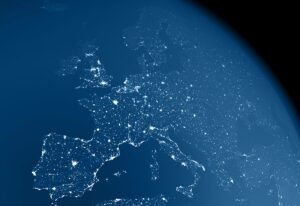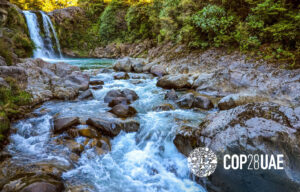- SIWI – Leading expert in water governance
- /
- Latest
- /
- Water and Climate: nine lessons to help us win the race to zero
Water and Climate: nine lessons to help us win the race to zero

People across the world joined the digital Water Day on 12 November as part of the Race to Zero Dialogues (9-19 November), held on the days originally planned for the international climate meeting COP26 which was postponed due to Covid-19 pandemic.
Race to Zero offered an important opportunity to rally leadership and support from businesses, cities, civil society organizations, scientists, citizens and investors to commit to delivering a net-zero, resilient future for all and to send a resounding signal to governments to increase their ambitions to the Paris Agreement. The event was inspired and guided by the Climate Action Pathway for Water, which you can read more about here.
A brief summary can be found here.
Water Day at Race to Zero November Dialogues
What comes next? The co-conveners of Water Day have compiled nine recommendations to inspire more countries, cities, investors, companies, and citizens to act on climate change through water. UNFCCC parties and other stakeholders will continue to exchange views and information during the Climate Change Dialogues 2020 (23 November – 4 December) running up to COP26 in Glasgow 2021. There is a need to keep momentum in the climate change process and continue our recovery from Covid-19, building back better and greener, and the time has come to fully tap the power of water.
What we must do together in this Race to Zero:
1) Support and contribute to the Climate Action Pathway for Water, which aims to lay out a clear vision for the water community to reach a 1.5-degree climate-resilient world by 2050 including transformative actions and milestones needed to achieve that future. We need to run toward a 2050 characterized by resilient management and wise governance of water and freshwater ecosystems, which will deliver significant impacts on climate mitigation and adaptation while achieving multiple sustainable development benefits.
2) The water sector must make bold climate action commitments. Through the protection and restoration of freshwater resources for ecosystems and people; the sustainable use and distribution of water for governments, businesses, investors and citizens; and the reuse of freshwater and wastewater at a global scale, approximately 10 per cent of global greenhouse gas emissions could be addressed, according to the 2020 GIZ report Stop Floating, Start Swimming.
While this is an ambitious target, there are encouraging examples of sector leaders who are already rising to the challenge. During Water Day, Water UK and Aguas Andinas Chile presented their groundbreaking, sector-wide plans to achieve a net zero carbon future – decades ahead of national governments. We need more of these ambitious commitments and plans!
3) Water is a critical part of the mitigation solution. Mitigation is sometimes a lesser-known aspect of how water and climate change are interlinked. Professor Johan Rockström pointed out that great amounts of carbon are stored in freshwater ecosystems such as peatlands, mangroves, and marshes, as well as old-growth forests. If we do not manage to protect these ecosystems, global warming might become unstoppable, Rockström warned. Furthermore, water can mitigate carbon emissions through improved water- and wastewater utilities. Important pilot solutions developed by the WaCClim project have achieved total mitigation equivalent to 10,000 tons of carbon dioxide or planting 50,000 trees per year.
4). Protect and restore 30 per cent of the Earth’s water-related natural ecosystems by 2030. Water-related ecosystems hold untapped potential for sequestering carbon and at the same time play an increasingly significant role protecting us from the impacts of climate change. Wetlands, for example, reduce the risks of drought and floods while also filtering out pollutants and recharging aquifers, whilst storing twice the amount of carbon as forests.
“Despite all these values, wetlands are also the most endangered ecosystem today and I don’t think the public is aware of that,” said Martha Rojas Urrego, Secretary-General of the Ramsar Convention on Wetlands during Water Day. Just 19 per cent of all wetlands are currently listed as protected by RAMSAR and they suffer a loss rate that is three times that of the world’s forests. Greater investment in protecting and restoring these disappearing carbon sinks is essential to meeting our climate goals. Innovative finance mechanisms such as municipal green bonds or blended public-private finance can help take NBS projects to the appropriate scale required to optimize the adequacy and effectiveness of these interventions.
5) Rethink our food systems. “The industrial agricultural system has never been more productive and efficient, but it is not sustainable,” said Ertharin Cousin former Executive Director of United Nations World Food Programme. Today’s food production is heavily dependent on scarce water resources and is very energy-intensive with a large carbon footprint. There is a need to pay closer attention to the food, water and energy nexus and start to collaborate on locally-appropriate, regenerative, and restorative solutions that align with the protection of freshwater resources, ecosystems, and people.
6) Value water. During the Closing session of Water Day, Carolina Schmidt, COP25 President and Minister of Environment of Chile, stated that “the world must now transform how it manages its water”. This includes ensuring that the most vulnerable and indigenous peoples with traditional knowledge are recognized as agents of change. As South African climate activist Akhona Xotyeni reminded us, the value of local, indigenous and intergenerational knowledge is essential in developing and implementing responses at all levels.
7) Place water at the centre of national climate plans. As Inger Andersen, Executive Director of the United Nations Environment Programme stressed, many countries already refer to water in their Nationally Determined Contributions, but only a few see water’s full potential to help countries meet their Paris Agreement targets. Water’s contribution cannot be limited to the water sector. Water must be accounted for across all our climate commitments – in particular energy commitments – to ensure that our clean energy solutions can meet future demand without exacerbating water stress over the medium-to-long term.
8) The private sector has a critical role to play through more ambitious actions that create positive, reinforcing ambition loops between the public and private sector. We are already seeing this from companies such as Ecolab and Woolworths. As Sanda Ojiambo, CEO and Executive Director of the UN Global Compact stressed: “By redoubling its own ambition — and thus reinforcing positive action by Governments — the private sector can and must play a central role in advancing water resilience.”
9) Invest in a new generation of wastewater treatment. The Water Day included examples of the potential of wastewater as a significant source of renewable energy, nutrients and water. Yet today, 85 per cent of all wastewater produced globally leaves sites untreated and unused. We must revolutionize our approaches to this invaluable resource and tap its potential. Governments can start by promoting policies that enable the complete and net-zero treatment, reuse and recycling of wastewater.
Let’s make sure that water is at the top of the climate agenda in 2021!
Water Day was organized by Stockholm International Water Institute – SIWI, the International Union for the Conservation of Nature (IUCN), the Alliance for Global Water Adaptation (AGWA), UN Global Compact/CEO Water Mandate and CDP, with the support of the UNFCCC Marrakech Partnership for Global Climate Action (MPGCA) and the COP25 and COP26 High-Level Champions. Please join us as we continue in the Race to Zero! If you are interested to get updates from the Water Partners of the Marrakech Partnership for Global Climate Action – drop us a line at mpgca-water-partners-2020+subscribe@googlegroups.com.
Most recent

SIWI Amman and UNICEF host Libya representatives for WASH exposure visit
- Water, Sanitation and Hygiene (WASH)
- Water governance

Water and land: Partners in climate mitigation
- Water in landscapes
- Wetlands
- Water governance

What is the role of water in rural and urban school facilities?
- Water, Sanitation and Hygiene (WASH)
- Water in landscapes
- Water governance
- Gender and water

Taking root: locally driven forest landscape restoration
- Water in landscapes
- Wetlands
- Groundwater
- Resilience through water

There is no resilience in Europe without a water-resilient Europe

The world can’t afford a water dry Summit of the Future

Inclusive and water-smart landscape restoration approaches for successful climate mitigation

